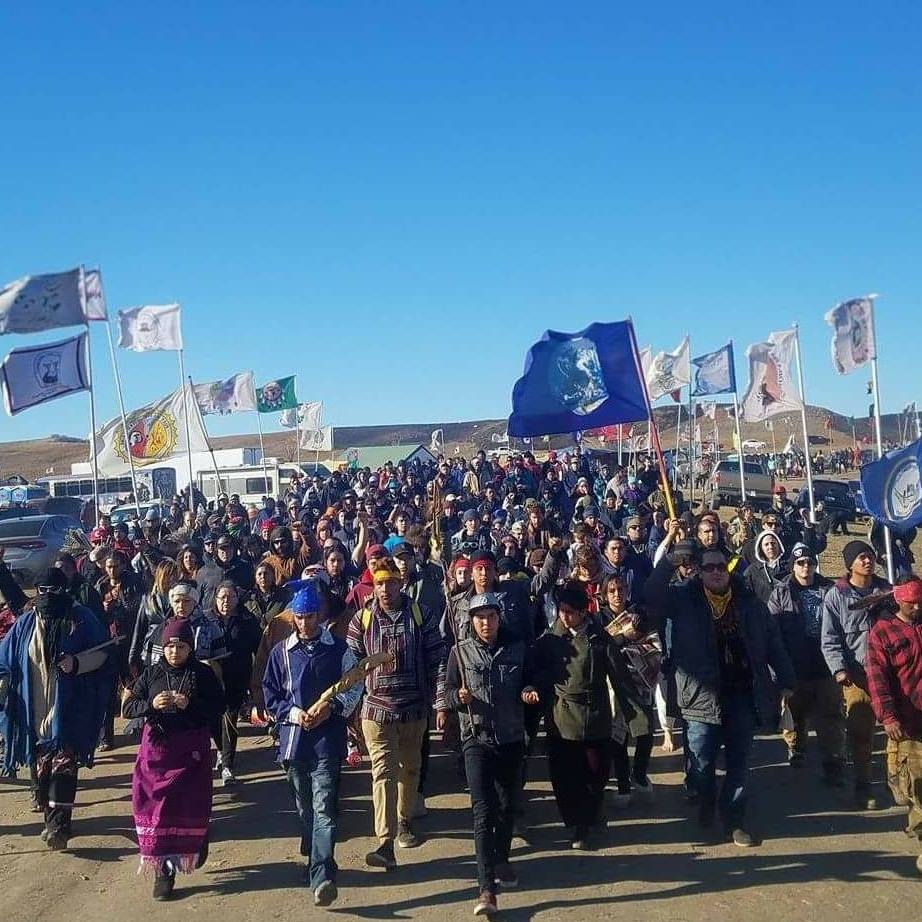Featured, Roddenberry Fellowship
The Promise to Protect: a new environmental justice movement grows
Judith LeBlanc | May 30, 2019
Science is catching up with traditional Indigenous knowledge. The United Nations released a report, which documented that over a thousand animals and plant species are endangered due to human activity. From an Indigenous frame of reference, all things are related and have impact far into the future. In today’s world, humans are not in good relationship with the natural world.
We are, as we say in Indian Country, not being “Good Relatives” with Mother Earth. Powerful, greedy fossil fuel corporations are the primary source of climate destruction and therefore the primary target for the social movements who must take up the challenge of saving Mother Earth. They buy and sell the natural world as commodities to enrich a handful.
Many of the recent struggles that succeeded in derailing fossil fuel extraction have been Native initiated movements that brought together alliances strong enough, with multiple tactics to stall or stop Big Oil’s grand projects of drilling in the Arctic, or building coal terminals in the Northwest or pipelines in the Great Plains.
For the past several years, South Dakota and Nebraska Native leaders and farmers and ranchers, have succeeded in preventing TC Energy (formerly TransCanada) from building the Keystone XL Pipeline. President Trump vowed to build the pipeline as soon as he entered the office. He is escalating his efforts on behalf of TC Energy by issuing an executive order designed to undermine the judicial processes that have delayed construction.
And we are also escalating our efforts. The Native Organizers Alliance partnered with 350.org for the Promise to Protect Tour, where Native and non-Native facilitators trained over 1,000 people in nine cities. The tour offered an opportunity to begin a new way of thinking about the role of community building, place-based protocols, and practices in organizing movements that will become stronger than Big Oil.
The beauty and the power of the project is not the scale of training over 1,000 people in nine cities, it was the intention of bringing together of Native and non- Native facilitators to put forward a vision of what being a “Good Relative” looks like as we build grassroots movements to keep all fossil fuels in the ground.
The Native trainers committed to sharing traditional, place-based practices that guide our historic, moral and inherent relationship to the natural world, and the responsibility, both legally and culturally to be caretakers of Mother Earth.
In practice, we know that we cannot turn back the climate crisis alone. Our collective organizing efforts must be spiritually grounded in values that focus on how all of our descendants will thrive in the future governance of reciprocity, respect for tribal sovereignty and economic and racial justice for all. We explored how values-driven movement can restore the balance that is needed now.
We asked participants to dig into their own placed based practices of community building that have developed over time. In the struggle to prevent the Keystone XL Pipeline being built, the Lakota traditions, and those of the land-based peoples of South Dakota are what will guide how people, if invited, come to the pipeline route.
The Promise to Protect trainings were designed to grow deep solidarity with the Native leadership and farmers and ranchers along the proposed pipeline route and at the same time expand the numbers of those willing to stand against fossil fuel infrastructure affecting their own communities.
Although the Trump administration, the South Dakota Governor who worked with TC Energy to force a bill through the South Dakota State Legislature to criminalize pipeline protests may see these trainings as a threat. When in reality it is a promise to peacefully act with values to restore a good relationship with the natural world.
This tour is a reflection of a new stage in the environmental justice movement. We are building a values-driven movement that works to dispel racist, colonial stereotypes, pinpoints the main cause of climate crisis and advocates for the alternatives to fossil fuels. We are growing a movement with eyes on how we want our descendants to live, together in balance with the natural world.
The solution to the impending climate catastrophe rests with organizing social movements rooted in ways of being in balance with the natural world and driven by need, not greed and racial divisions. Being a Good Relative is the path.
Click here to watch our Promise Tour highlight video on Facebook and share it with your friends and family.
About the Author
Judith LeBlanc is a 2019 Roddenberry Fellow, a member of the Caddo Tribe of OK and the director of the Native
Organizers Alliance. Learn more about Judith and Native Organizers Alliance work here: http://nativeorganizing.org/




